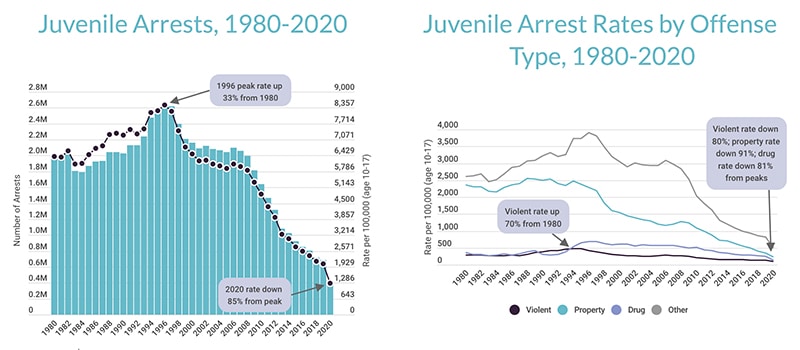Volcanoes are erupting in The Philippines, but on-fire Australia received some welcome rain. The Iran war cries have been called off and The Donald’s military powers are about to be hamstrung by the Senate. Meanwhile, his impeachment trial is starting, and we’re all on Twitter for a front-row seat.
What Could Go Right? Three mega-trends
Solar and electric vehicles keep the 1.5C warming goal in reach, the US continues to decarcerate, and Britain goes secular.
This is our weekly newsletter, What Could Go Right? Sign up here to receive it in your inbox every Thursday at 5am ET. You can read past issues here.
What Could Go Right?, the podcast, returns for Season 5 on October 4th. Co-hosted by The Progress Network’s founder, Zachary Karabell, and me, Emma Varvaloucas, we have an exciting season planned with guests like clean energy entrepreneur Jigar Shah, writer Rebecca Solnit, and Harvard University’s first female president, Drew Gilpin Faust. Plus we discuss underreported good news every week. Subscribe on your favorite podcast player here. It’s free!
Three mega-trends
The world is always changing, bit by bit and sometimes all at once. This week, we take a bird’s-eye view of three mega-trends affecting large numbers of people: social attitudes in Britain, decarceration in the United States, and the global climate transition. Read all three or skip to the one you care about most!
Britain goes secular
For 40 years, the National Centre for Social Research, the largest independent and nonprofit social research organization in the United Kingdom, has been tracking British attitudes toward social and moral issues. In their latest report, they say that these have undergone such a “profound, long-term, secular change” that “Britain now looks and feels like a different country.”
For example:
- In 1983, 50 percent of respondents said that sexual relationships between adults of the same gender were “always wrong.” Now just 9 percent express that view.
- 76 percent say that the law should allow an abortion if the woman decided on her own that she does not want to have the child, up from 37 percent in 1983.
- In 1987, 48 percent agreed that “a man’s job is to earn money, a woman’s job is to look after the home and family.” Now, only 9 percent agree.
Attitudes toward transgender rights have reversed sharply in recent years, however: 30 percent now say that a transgender person should be allowed to have the sex on their birth certificate changed if they want, down from 53 percent in 2019.
The report puts down these massive changes to “generational turnover.” Each new generation is more liberal than the one before.
Attitudes around politics, economics, and the role of the state were more cyclical, reflecting rising concerns about poverty and the ability to move up in society. There is a lot more in the report here.
Do we have any British readers? Send in your thoughts by clicking “reply.”
The US continues to decarcerate
The US’ harsh criminal justice landscape is well known; we are a world leader when it comes to incarceration rates. Recently, however, our criminal justice footprint has been shrinking, per a new report from the Council on Criminal Justice.
From peaks in the 1980s and 90s, violent and property crimes are both down:

Accordingly, so are arrests, incarceration rates, and the number of people on probation and parole. In 2008, we incarcerated 1 in every 100 adults, for instance. That is down to 1 in 147 in 2021.
The changes in juvenile justice in particular are astonishing. Arrest rates have dropped dramatically from a peak in 1996, in all offense types (violent, property, drug, and other).

These declines are similar across race, too, with overall arrest rates in 2020 beginning to converge across white, black, Native, and Asian Americans.
We are also holding far fewer juveniles as adults in local jails and in state and federal prisons. The first juveniles held in jail as adults—3,300 of them—were reported in 1993. That number fell to 1,700 in 2021. In state and federal prisons, almost 4,000 juveniles were being held as adults in 2000, but only 292 in 2021.
President and CEO of the Council on Criminal Justice, Adam Gelb, wrote a summary for USA Today that also highlights the importance, as a society, of acknowledging this progress. The full report is here.
The world reaches for 1.5 warming target
In 2021, The International Energy Agency (IEA) released their roadmap to net zero by 2050, outlining a path forward for what needs to be done in the global energy sector to keep the 1.5 Celsius of warming goal in reach. They have just released a 2023 update that takes into account the clean energy boom that has occurred since.
The big picture, as IEA’s Executive Director Fatih Birol wrote on X, is that the path to 1.5C has narrowed, but the “staggering growth of clean energy technologies” is “keeping it open.”
Global emissions reached a new high in 2022, 1 percent above their pre-pandemic level. They should peak this decade. The IEA forecasts that even without any new climate policies, fossil fuel—coal, oil, and natural gas—demand will also peak this decade. The report calls this “encouraging, but not nearly enough for the 1.5 Celsius goal.”
There has been rapid installation of renewable energy like solar and wind. If already set policy is followed, advanced economies and China are on track to achieve 85 percent of their needed contribution by 2030, says the IEA. Developing economies need more support.
The really great news is that two pieces of the puzzle—the trajectory of solar installation and electric vehicle adoption—are in line with what the IEA’s 2021 report recommended.
But many other pieces are not. The report’s three key suggestions for keeping the 1.5C dream alive are tripling renewable capacity, doubling energy efficiency, and cutting methane emissions by 75 percent by 2030.
Quick hits
- From our friends at the newsletter Future Crunch: “Uganda just released its national health survey. Fertility rates are down, contraceptive use is up, nine in ten women now give birth accompanied by skilled attendants, child mortality has almost halved in the last decade, childhood stunting rates have fallen by a quarter, maternal mortality has halved, and a majority of children now receive all basic vaccinations.”
- Texas’ city with the most refugees per capita, Amarillo, is launching an AI chatbot that will function like a “311” and speak 62 different languages.
- Post the Black Lives Matter protests, 94 percent of new jobs in the US’ biggest public companies went to people of color.
Below in the links section, Tesla’s “gigacasting” breakthrough, the world’s first humanoid robot factory, AI-translated podcaster voices, and more.

“What Could Go Right?” Season 5

Negative news can be overwhelming, but it’s important to question whether it accurately reflects our world. Join “What Could Go Right?” to hear positive stories from various experts and challenge the negative narrative. Let’s strive for a more balanced view of what’s happening today. Season 5 begins October 4th. | Listen to the trailer
Progress, Please
(Found good news? Tweet at us @progressntwrk or email.)
Other good stuff in the news 🐆
Energy & Environment:
- Peru signs $20-million debt-for-nature swap with focus on Amazon rainforest | Mongabay
- In search of cool green spaces, Paris turns to an old rail line | The New York Times
- Why Texas animals have dedicated crossings throughout the state now | Houston Chronicle
- Tesla reinvents carmaking with quiet breakthrough | Reuters
- Carnivorous plants return to Lancashire peatland after 100 years | The Guardian
- The relationship between extreme weather and climate change | Kite & Key Media
- The first e-bike that doesn’t need a battery | Euronews
- 39.5% increase in snow leopard numbers in Bhutan ‘a milestone achievement’ | WWF
Public Health:
- Smoking in the UK has continued to decline over the past decade | ICAEW
- Danaher lowers cost of TB tests after pressure from John Green, activists, and orgs | Good Good Good
- Free Covid tests are now available for order from the US government | CNN
- Kenya achieves remarkable 68% decline in Aids-related fatalities | The Star
- Eswatini achieves 95-95-95 HIV treatment target—a decade ahead of 2030 goal | WHO
Science & Tech:
- World’s first humanoid robot factory set to open this year | Interesting Engineering
- First space-based 5G call promises coverage across the globe | Interesting Engineering
- Spotify is going to clone podcasters’ voices—and translate them to other languages | The Verge
- An implantable device could enable injection-free control of diabetes | MIT News
- Lyric Opera’s new SoundShirts let deaf patrons feel the music | Axios
Politics & Policy:
- Inside Biden’s White House Office of Gun Violence Prevention | The Trace
- US judge throws out Texas ban on drag acts, calls it unconstitutional | Reuters
- Supreme Court rejects Alabama’s bid to use congressional map with just one majority-Black district | NBC News
- New Jersey schools to offer free menstrual products for students grade 6 through 12 | PBS News Hour
- Pennsylvania will start automatic voter registration | The New York Times
- States and cities eye stronger protections for gig economy workers | Source New Mexico
- Landmark blanket ban on corporal punishment in Kashmir schools | Greater Kashmir
- White House aiming to scrub medical debt from people’s credit scores, which could up ratings for millions | AP
- India’s lower house votes to reserve a third of seats for women | The Guardian
- What America can learn from Canada’s ‘$10 a Day’ child care system | The Hechinger Report
Society & Culture:
- Transforming Nigeria: How 1.5 million girls found their way to school | UNICEF
- WhatsApp is preventing child marriage in rural India | Reasons to Be Cheerful
- Record number of internet users, two-thirds are now online | Warp News
- Britain is much more liberal-minded than it was 40 years ago, study finds | The Guardian
Economy:
- US Fed pauses interest rate increases as it aims for a soft landing | The New York Times
- Writers Guild and studios reach deal to end strike | The New York Times
- Small business owners are feeling more confident lately | Axios
- The end of poverty in Canada should be bigger news than it is | Financial Post
TPN Member originals 🧠
(Who are our Members? Get to know them.)
- The false trade-off between climate action and economic growth | Ian Bremmer
- 6 Down Wing myths about the American economy and the world | James Pethokoukis
- How to actually get happier: The science of fulfillment | Arthur C. Brooks
- The SATs will be different next year, and that could be a game-changer | Adam Grant
- Rise of Vivek and RFK Jr., Romney retires, and climate protests | Isaac Saul
- Feeling burned out? Here’s what to do | Arthur C. Brooks
- Why do conservatives attack abortion and trans rights in the same ways? | Jennifer Finney Boylan
- Fatherhood and marriage, redux | Richard V. Reeves
- David Axelrod on 2024 | Yascha Mounk
- Bringing Ukraine into NATO and the EU is the key to peace | Thomas L. Friedman
- Is life better than ever for the human race? | Steven Pinker & Ian Bremmer
- The true origins of woke: Where the new identity politics went wrong | Yascha Mounk
- Democrat Bob Menendez is indicted | Isaac Saul
Department of Ideas 💡
(A staff recommendation guaranteed to give your brain some food for thought.)
The children leaving the Mafia | BBC
How should the state protect children raised in organized crime families? Italian courts are tackling this thorny issue.
Why we picked it: A fascinating read on a controversial topic I had never heard about before. Should the Italian government remove children from Mafia homes when certain extreme conditions—like involving their kids in crime—are present? —Emma Varvaloucas
Until Next Time
Reading horse, library rat, ink drinker—see this thread for more names for bookworms around the world. 📖 🪱



[…] What could go right? Three mega trends […]